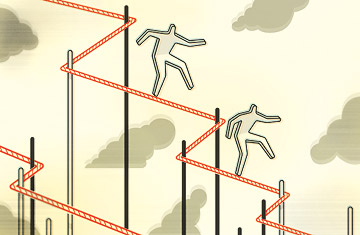
Over the past two decades, wall street and the rest of the financial ecosystem became obsessed with the quantification of risk. Assigning numbers to the chance of something bad happening is a centuries-old endeavor--mortality tables have been used to devise insurance premiums since the 18th century. With modern computing power, though, financial engineers captured, packaged and sold risk exposure in startlingly new ways. Buying protection against a bad corn harvest or a spike in interest rates was just the beginning. Over time, as instruments became more complex, a huge shift occurred. Risk itself became the thing to trade--and to make money on. In the process, risk was redistributed to the people who could best handle it, making everyone safer.
Except that last part wasn't true.
There are many lenses through which to view the worldwide financial crisis as it has rippled from soured loans to banks' balance sheets to the credit markets and, finally, into the real economy. Lenders were greedy, people lived beyond their means, government abdicated its responsibility to regulate. Through all those explanations runs the thread of risk--and how it was mismanaged. Financiers, as well as the investors who bought their wares and the ratings agencies that evaluated them, agreed that by applying the proper equations it was possible to, say, bundle a bunch of subprime mortgages, chop them up and sell the pieces as fairly safe securities, even as they were leveraged to the hilt. Why? The mathematical models--backward-looking and based on just a few years' data from an asset bubble--said so. "As an industry, we let financial tools be a substitute for human judgment," says Kevin Blakely, CEO of the trade group Risk Management Association. "There's been such an earthquake in the industry, people are saying we have to do it differently."
What is the future of risk? In the short term, an era of risk aversion is sure to continue, as financial outfits, gripped by the fear that something more will go wrong--loans not paid back, a company on the other side of a trade going bust--pull back on everything from the creation of complex securities to credit-card limits.
But as the appetite for risk returns--and it always does--companies are promising long-lasting change. This time around, they'll handle it differently, they say. Banks are stuffing their boards with risk experts. Trade groups are circulating white papers on the need for risk-adjusted compensation all the way down to rank-and-file employees. In the future, we're told, decisions at firms like Citigroup and UBS about what lines of business to pursue will be made with more of an eye to how much risk comes along with the profit. Merrill Lynch's running into the arms of Bank of America and its steady-Eddie deposit base, and Morgan Stanley's and Goldman Sachs' opting to become bank holding companies can be read as early evidence of the move toward that balance.
And so risk morphs from a slop trough of moneymaking into a business line like any other, one that requires human beings to ask the big-picture questions that computer models don't, like, What would happen if fundamental assumptions--house prices go up, institutions are too big to fail--prove to be wrong?
